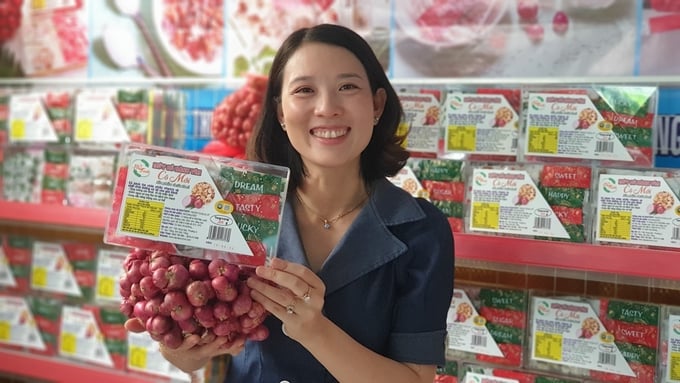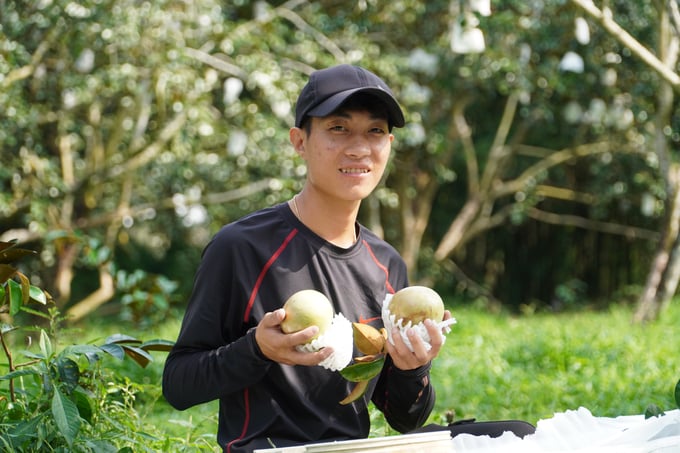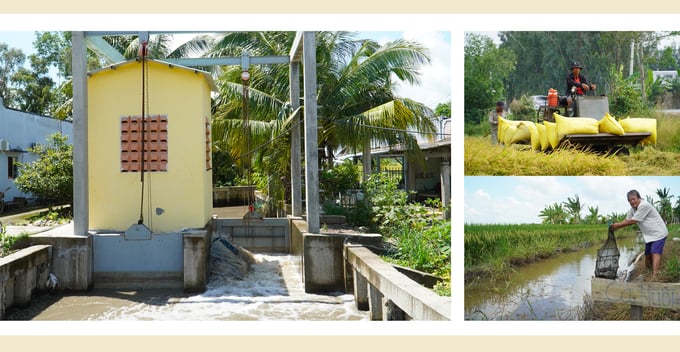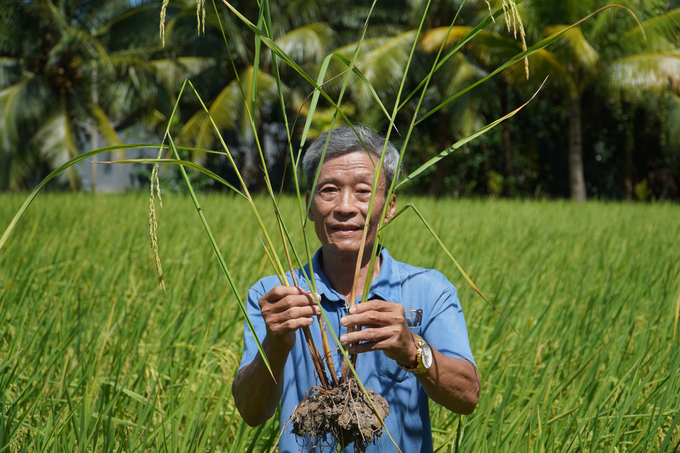May 16, 2025 | 10:55 GMT +7
May 16, 2025 | 10:55 GMT +7
Hotline: 0913.378.918
May 16, 2025 | 10:55 GMT +7
Hotline: 0913.378.918
Soc Trang is the first province in the "Nine Dragons" region to issue the Organic Agriculture Development Project for the 2021–2025 period with an orientation toward 2030.
Sharing the same goal of creating safe products, seven households in Block 6, Ward 7, Soc Trang City, have joined forces to establish an organic sawleaf cooperative on a 2-hectare scale.
The cooperative is supported by the Soc Trang Provincial Organic Agriculture Development Project Management Board in building technical processes and providing training for its members on organic cilantro cultivation methods.
Farmers are highly conscious of adhering to the process and closely monitor one another. Currently, the entire production process of the cooperative uses only organic fertilizers and biological plant protection products.
Mr. Dien Len, the leader of the cooperative, shared that in the early stages of transitioning to organic farming, members faced many difficulties. However, over time, the soil gradually recovered, sawleaf grew well, resisted pests and yields stabilized.
"Producing organic products is hard, but maintaining trust with customers is even harder. What we keep in mind, first and foremost, is the health of both producers and consumers, and then aligning with market trends. Moreover, the price difference between conventional and organic products helps members increase their income. Therefore, we are committed to working closely together and ensuring effective management to grow", Mr. Dien Len shared.
Established in November 2021, Vinh Loi Agricultural Cooperative (in Hamlet 15, Vinh Loi Commune) has 22 members cultivating 97 hectares of rice.
In 2018, for the first time, members began experimenting with 5ha of rice cultivated according to organic processes. Throughout the entire farming process, from fertilizing to caring for the crops, the farmers had to strictly adhere to numerous regulations.
In addition, to ensure that members do not violate the farming process, each farmer must cross-check the practices of other households. The accompanying enterprise will take soil, water and rice samples during the flowering stage to analyze chemical residues in the products.
In the initial years of organic farming, the yield was quite low, at only about 4.5 tons/ha, but it gradually increased each year.
Currently, the area of organic rice cultivation at Vinh Loi Agricultural Cooperative has expanded to 70ha. Of this, 50ha have been certified organic and the remaining area is expected to be certified by the end of 2025.

After the Prime Minister approved the Organic Agriculture Development Project for the 2020-2030 period, Soc Trang Province became the first locality in the Mekong Delta to realize this decision.
Accordingly, Soc Trang Province has allocated nearly 2.82 million USD to support farmers and cooperatives in implementing training programs, building production models and working toward organic certification for products.
After two years of implementation, the project has established organic production processes for 32 models, primarily focusing on fruit trees, rice, and vegetables. Notably, in 2023, 14 organic production models were implemented, receiving consultation for certification evaluation, covering a total area of over 161ha.
Mr. Vuong Quoc Nam, Deputy Chairman of Soc Trang Provincial People's Committee, stated that the implementation of the project aims at multiple objectives. However, the ultimate goal is for the products to be certified organic, creating clean and safe products that benefit consumer health. Alongside this, it also aims to ensure ecological balance and improve soil nutrition.

The results that organic agricultural production brings to farmers cannot be denied. As of the end of 2023, the Organic Agriculture Development Project in Soc Trang Province for the 2022-2025 period has implemented a comprehensive approach across five components.
Although the effectiveness and impact of the project have not yet produced many organic production models and the value of the products is still low, it has initially changed the perceptions of the people participating in organic production models in the province. It encourages farmers to apply scientific and technical advancements in agricultural production. At the same time, it creates more job opportunities, increases income for residents and develops the rural agricultural economy.

However, according to the project management board, some input materials for organic production are very difficult to source, and labor costs in organic agricultural production are also higher than in conventional production.
In addition, most organic models in Soc Trang Province are still in the implementation phase with small scales and transitioning production, so the output is still low compared to the purchasing demand of enterprises.

According to feedback from some farmers participating in the organic production transition models, the quality of some biological pesticides on the market, despite having undergone screening and evaluation, does not meet the requirements for controlling and eliminating pests, diseases, and weeds. This leads to a mindset of comparison regarding quality and effectiveness, causing farmers to be hesitant to use organic products. This issue creates a barrier for the efforts to encourage and guide farmers in using organic fertilizers and pesticides.
In response to these challenges, in the 2024–2025 period, Soc Trang Province will provide consulting support for organic production for 14 models that meet the requirements of evaluation organizations according to Vietnamese or international organic standards.
At the same time, the province will hire consultants to investigate, analyze, and evaluate the economic, social, and environmental impacts of implementing the project after two years, in order to accurately and objectively assess the results achieved and propose directions for the next phase (2026–2030).

In addition, support will be provided to households, cooperatives, and organizations to produce certain agricultural products entirely according to organic processes, aiming to achieve Vietnamese Standards (TCVN) or international standards (TCNN) within a maximum of three years.
The province will invite businesses that have previously purchased agricultural products from local farmers to connect and participate in the project. Contracts will be signed to guarantee product purchases with farmers’ organizations during the transition period until they achieve organic certification.
Continue to support 50% of the input materials for organic production models during the transition process. Identify and source a group of input materials that meet the required standards to supply to farmers.
In particular, organize internal evaluations according to organic standards; register for the certification of safe products for agricultural products during the organic transition. Progress toward registering for organic certification evaluation and promoting the scaling up of models.

Translated by Phuong Linh

(VAN) Cold-barn systems efficiently manage environmental and temperature conditions, which aids in the prevention of respiratory diseases in pigs and protects them from the vectors that transmit African swine fevers.

(VAN) To tackle challenges, the project 'Addressing key technical bottlenecks in the grouper supply chain in Vietnam' has been underway since 2024.

(VAN) The project 'Disease-Resilient and Sustainable Cassava Production Systems in the Mekong Region', funded by the Australian Center for International Agricultural Research (ACIAR), is being implemented from 2024 to 2028.

(VAN) Data from 10,000 farming households will help professionalize production organization and support the implementation of the One Million Hectares Program for High-Quality, Low-Emission Rice Cultivation.

(VAN) FAO Director-General QU Dongyu marks International Day of Plant Health at NENA conference.

(VAN) Deputy Minister of Agriculture and Environment Hoang Trung affirmed that floriculture and ornamental plants are a growing industry that receives significant global attention.

(VAN) The three staple crops dominating modern diets – corn, rice and wheat – are familiar to Americans. However, fourth place is held by a dark horse: cassava.